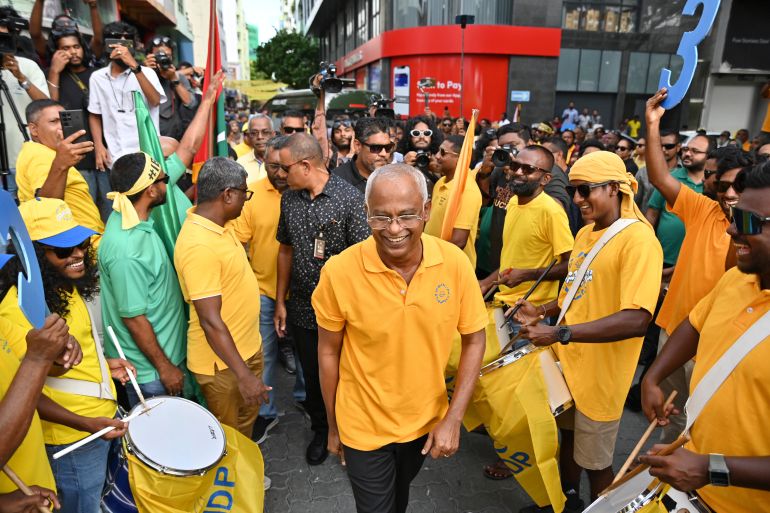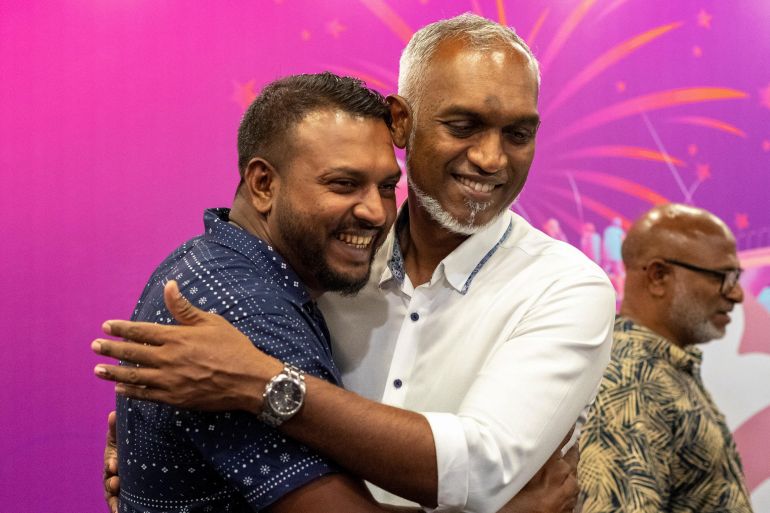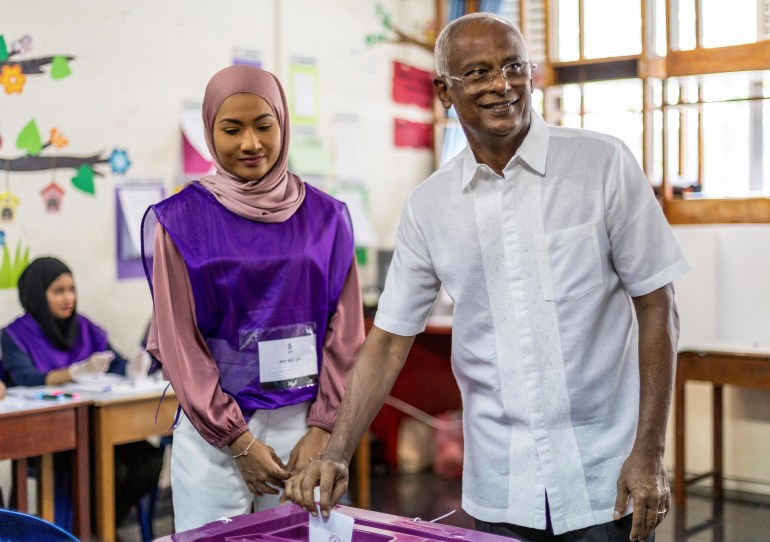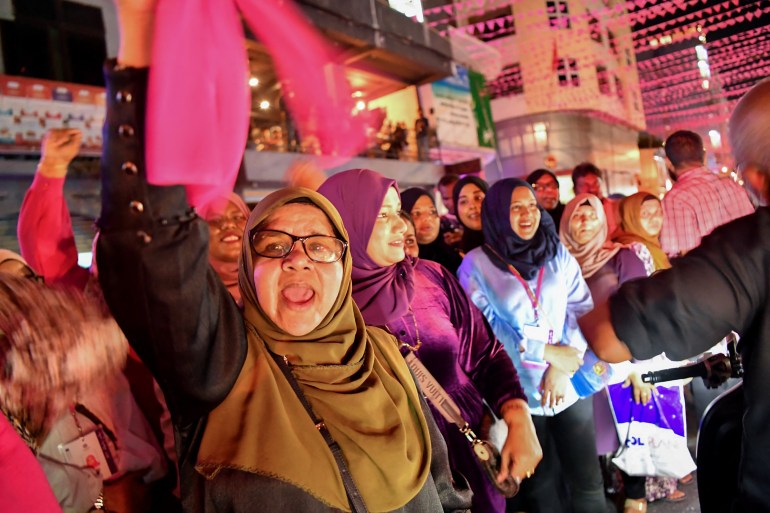Mohamed Muizzu wins Maldives election in victory for pro-China camp
Incumbent Ibrahim Mohamed Solih concedes defeat shortly before midnight after Muizzu wins 54 percent of the vote.
SOURCE: AL JAZEERA AND NEWS AGENCIES
Fate of India ties, democracy in balance as Maldives votes in run-off
Voters in the Maldives choose their next president in a run-off election closely watched by China and India.

By Al Jazeera Staff
Published On 30 Sep 202330 Sep 2023
Voters in the Maldives are casting their ballots in a presidential run-off that could determine the fate of the Indian Ocean archipelago’s nascent democracy as well as its ties with China and India.
The election on Saturday pits President Ibrahim Mohamed Solih, who has championed an India-first policy, against the mayor of the capital, Mohamed Muizzu, whose opposition coalition sought closer ties with China and oversaw a wide-ranging crackdown on dissent while in power from 2013-18.end of list
Muizzu emerged as the surprise frontrunner during the first round of voting on September 8, taking some 46 percent of the ballots cast. Solih – hurt by low voter turnout and a split within his Maldivian Democratic Party (MDP) – won 39 percent.
But with the incumbent leader ramping up his campaign – including with pledges of handouts and warnings of a return to authoritarianism should his opponent win – the run-off looks too close to call, according to observers.
Polling opened at 8am local time (03:00 GMT) and will close at 5pm (12:00 GMT). Vote counting begins immediately afterwards, and the results will likely be known within hours.
Some 282,804 people in the country of 500,000 people are eligible to vote.
Here’s what you need to know about the Maldives’s high-stakes election.
China-India rivalry
The run-off has significant implications for the Maldives’ foreign policy, as the outcome could be key in deciding China and India’s battle for influence in the strategically located archipelago.
Solih, who won the last election in 2018 amid widespread anger over corruption and human rights abuses under his predecessor, has brought the Maldives closer to India, obtaining more than $1bn in loans for housing and transport projects in the capital, Male.
The Maldives owes a similar amount to China.
Under Solih’s predecessor, Abdulla Yameen, Beijing funded a first-of-its-kind bridge connecting Male to its neighbouring islands, as well as upgrades to the Maldives’s main international airport.
The infrastructure projects have driven the Maldives’ debt to 113 percent of the country’s GDP at the end of 2022, with India and China estimated to hold 26 percent of GDP each.
N Sathiya Moorthy, a political commentator based in the Indian city of Chennai, said for both Beijing and New Delhi, Saturday’s election is “about the predictability of their Maldivian relations under the next presidency”. Solih is by now predictable for both, he said, but Muizzu – who is contesting the election after Yameen was jailed on a corruption conviction last year – spells uncertainty.
This is because Muizzu’s Progressive Party of Maldives (PPM)-led coalition has launched a vitriolic “India Out” campaign seeking to reduce what it calls New Delhi’s outsized influence in the country’s affairs. “India has become the unnamed issue in this second round of polling with anti-India social media posts doing the rounds much more than in the first,” Moorthy said
.

The Maldives’ main opposition candidate Mohamed Muizzu participates in a rally [Mohamed Sharuhaan/AP]
Fears for democracy
A change in government will not only test the country’s foreign policy, but also its fledgling democracy.
Muizzu’s opponents say the mayor – who was a cabinet member in Yameen’s government – could return the country to the authoritarianism seen under the former president. While in office, Yameen presided over a wide-ranging crackdown on dissent that included the jailing of nearly all opposition leaders, the prosecution of journalists and a huge corruption scandal, in which tens of millions of dollars were stolen from public coffers and used to bribe judges, legislators and members of watchdog institutions. He also turned a blind eye to the growing presence of groups linked to al-Qaeda and ISIL (ISIS), even after the killing of a young journalist and a blogger.
“The Maldivian experiment with democratic politics is still very precarious,” said Azim Zahir, a lecturer and research fellow in international relations and politics at the University of Western Australia in Perth. “This very experiment was under serious threat when PPM was in power. The fact that Muizzu was a cabinet minister of that government makes me really nervous for the future of democracy should he win the election.”
Amid the fears, Muizzu has repeatedly pledged not to go after his political opponents.
“I do not support brutality,” the 45-year-old mayor told the Dhauru newspaper last week. “I will not take action against my opponents for disagreeing with me … Everyone will have the opportunity [to carry out political activities].”
Ruling party split
Solih, meanwhile, has dismissed Muizzu’s assurances.
The incumbent has portrayed Saturday’s vote as a contest between democracy and autocracy.
“This election is a choice between peace and stability in the Maldives, or brutality, fear and chaos,” the 61-year-old president told supporters on the eve of the run-off. “If you do not vote [for me], the whole of Maldives may have to mourn and shed tears.”
With much at stake, the president has sought to win the backing of third, fourth and fifth placed candidates in the first round, but to no avail.
The politician who came in third in the first round of voting was Ilyas Labeeb, who won seven percent of the ballots cast. Labeeb was the candidate of the Democrats, a party founded by Parliament Speaker and former President Mohamed Nasheed, who fell out with Solih after losing a bitterly contested presidential primary earlier this year.
Nasheed and the Democrats accuse Solih of failing to fulfil campaign pledges he made in 2018 to ensure justice for the Maldives’s biggest corruption scandal as well as the al-Qaeda-linked killings. They also accuse his government of putting in place a vast system of patronage, using state-owned enterprises to buy out the media and hand out thousands of jobs to ensure political loyalty.
The government denies the claims.
Without the backing of the Democrats, Solih comes to the second round with a “significant disadvantage”, said Ahmed Shaheed, a former Maldives foreign minister and professor of international human rights law at the University of Essex in the United Kingdom.
“It is quite striking that [Solih] has not managed to put together a firm coalition. And without an open endorsement from [Nasheed], it is unlikely the Democrats will vote for Solih,” Shaheed said.
“It’s going to be a very tight contest,” he added. “I don’t think anyone is in a position to comfortably declare that the election is theirs.”
SOURCE: AL JAZEERA




No comments:
Post a Comment